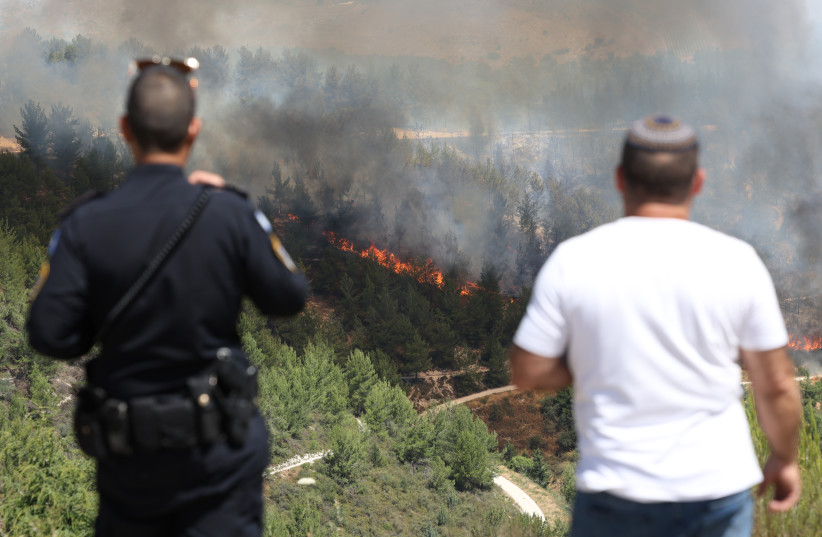The fires that swept northern Israel this week due to Hezbollah’s rocket, missile, and drone attacks were a wake-up call. The Israeli public is now forced to see what almost eight months of appeasing Hezbollah has brought.
Hezbollah launched thousands of drones, missiles, and rockets at Israel, and although the IDF responded proportionately to these attacks, this had the effect of weakening Israel’s deterrence and letting Iran attack Israel openly – through its proxy. Most countries would never accept one rocket fired from a neighboring country, let alone 4,000.
For decades, Israel has been lured into accepting these attacks. Israel’s politicians and security establishment have decided that the country will accept terrorist groups on every border launching rockets at Israeli civilians. October 7 brought with it a massacre of 1,200 Israelis, the kidnapping of 252 people, and the displacement of 200,000 citizens. In essence, Israel has already surrendered two of its borders and is in the process of getting to the same place in the northern West Bank, where attacks have not stopped.
However, the public generally is fooled into accepting this by the trauma of October 7 and a “this is fine” mentality, one that tries to cover up reality. In the North, this means that the entire border has been evacuated for most of the year, with no end in sight and the public is told to accept this. The theory is that the public can be evacuated bit-by-bit, so long as it does not spread to so the big cities, Tel Aviv or the West Bank or Jerusalem.
Fires has forced public to reexamine their reality
Iran knows this. It gives Tehran impunity to attack Israel all along the border. As Israel takes the blows and responds by eliminating a handful of Hezbollah members at a time or carrying out precision air strikes on empty buildings or empty fields, the enemy increases its attacks. The recent massive fires over the last few days has forced the public to look at what is happening. We hear demands that this cannot continue, for the first time in eight months.

Eight months ago we heard our defense officials warn that any attack by Hezbollah would see Beirut turned into Gaza, yet Hezbollah attacked and nothing happened. Then came the semantics discussion: the word “attack” is malleable.
Four thousand rockets is not an “attack,” 80,000 people evacuated is not an “attack” either, and thousands of homes that have been damaged but can be repaired, is not an “attack” either.
There was a time when Hezbollah didn’t fire any rockets, but Iran has successfully changed the equation so that any fighting in Gaza will result in Hezbollah attacks. That means that Israel cannot fight Hamas without evacuating the North. Iran has forced Israel into a two-front war that Israel is not willing to fight.
Israel has trained for a multi-front war for years, but when it came down to it, Jerusalem was not ready for it. Instead, Iran takes the initiative and decides where to attack. One day, it is from Iraqi militias, the next day it is the Houthis, followed by Palestinian terrorist cells in Tulkarm, and finally Hezbollah. Israel now faces endless attacks on seven fronts and without any answer to end this.
Perhaps a ceasefire in Gaza will temporarily end the attacks, while Iran pushes all its pawns up to Israel’s borders, awaiting the next move. Israel is in a precarious position on the regional chess board. Iran has made it so that Israel’s MABAM (war between the wars) in Syria has been flipped. Now, Iran is fighting the MABAM, and inside sovereign Israel at that, using Hezbollah, Hamas, PIJ, the Houthis, and other groups. Israel now faces the prospect of becoming, like Syria, a country that doesn’t control its own borders.
While Israel’s officials talk tough, the talk is empty so long as the fires in the north burn openly.
